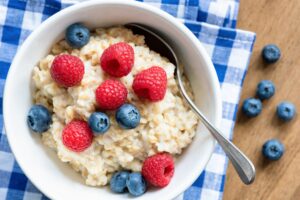The Dementia Diet During Quarantine
With the emergence of COVID-19 and related restaurant closures, you may find yourself spending a lot more time in the kitchen.
The National Institute on Aging recommends a diet rich in fruits, vegetables and whole grains, seafood, lean poultry and meats. But what if you are a time-starved caregiver looking after a loved one with Alzheimer’s or dementia? Meal prep takes time and is not always on the menu for busy caregivers.
Helping a loved one with dementia eat healthy can be both quick and easy thanks to innovations in appliances, tools and utensils.
Brain Food for Dementia
Not surprisingly, the most important benefit of the popular Instant Pot® is speed.
Anyone who has used an Instant Pot® is familiar with its innovative technology, which has helped make pressure cooking mainstream in busy households. There’s even a WiFi-enabled Instant Pot that allows you to cook on the go!
Oatmeal is one of the easiest things to cook in the InstantPot® for a quick and nutritious meal on the fly. It is always fulfilling – for breakfast, lunch or dinner – and can be topped with virtually anything.
Healthy memory-boosting berries are a favorite topping in memory care communities that specialize in the dementia diet. In fact, greater intakes of blueberries and strawberries are associated with slower rates of cognitive decline in seniors according to a study conducted over more than three decades!
Research published in the Annals of Neurology found that cognitive decline can be delayed by more than two years in people who eat more of the flavonoid-rich berries! Plus, according to the Whole Grains Council, grain-based foods, including oatmeal, boost cognitive health.
Tip: Serve oatmeal in a mug for easy consumption by those is later stage Alzheimer’s disease.
Steamed Veggies for Dementia
Steaming vegetables on a stovetop or oven can be tricky. But steaming vegetables in the Instant Pot, well, feels pretty instant.
Cruciferous vegetables like broccoli will steam to perfection in the Instant Pot while preserving nutrients.
Plus, research suggests broccoli can reverse damage caused by aging and slow down age-related memory decline!
According to research, neuroinflammation is involved in the regulation of aging, Alzheimer’s disease, Parkinson’s disease, Huntington’s disease, multiple sclerosis, stroke, depression, dementia, hypertension and diabetes.
According to a study published in Oxidative Medicine and Cellular Longevity, the antineuroinflammatory qualities of broccoli sprouts may inhibit the cognitive decline caused by inflammatory conditions.
Other research suggests the biological compounds found in cruciferous plants helps lower the risk of neurodegenerative diseases such as Alzheimer’s disease.
Steamed broccoli can also be served in bite-sized portions, which is ideal for those in the later stages of Alzheimer’s or dementia.
Cauliflower and brussel sprout are also cruciferous vegetables that steam well in the Instant Pot.
Tip: Serve steam veggies on a red or yellow plate, which are proven to stimulate appetite and help those with dementia focus on food.
Proteins for the Dementia Diet
Dementia can disrupt the way the brain processes hunger and cause weight loss.
What the slow cooker lacks in speed it delivers in convenience! Plus, slow cooking protein-rich foods like chicken fill the home with appetite-stimulating aromas that can help your loved one with Alzheimer’s or dementia feel hungry.
Lean chicken breast is one of the most versatile and popular proteins and can be slow cooked in large quantities and frozen in one cup portions for quick and easy thawing. It is the secret weapon of busy caregivers and can be chopped, diced or pulled to make an assortment of dementia-friendly dishes that are both tasty and easy to consume.
If your loved one is sheltering-in-place during the coronavirus pandemic, access to frozen pulled chicken is one of the best ways to quickly assemble a healthy meal for a loved one.
The smaller portions can be quickly reheated for use in a burrito or quesadilla, two finger-food favorites of memory care communities.
Tip: Serve finger foods to help a loved one with dementia maintain independence and dignity at meal time.
Finger Foods for Dementia
 Finger foods that are easy to pick up help those with dementia maintain independence during the middle to late stages of the disease when eating becomes more difficult. That’s because finger foods can be eaten and chewed more easily and without the need for cutlery, which helps those with limited coordination maintain a sense of control and self-esteem.
Finger foods that are easy to pick up help those with dementia maintain independence during the middle to late stages of the disease when eating becomes more difficult. That’s because finger foods can be eaten and chewed more easily and without the need for cutlery, which helps those with limited coordination maintain a sense of control and self-esteem.
Shredded Chicken Recipes
Bookmark these shredded chicken recipes for a busy night:
Slow-cooked pulled chicken sandwiches
Instant Pot shredded chicken tacos
As always, be sure to talk to your loved one’s doctor to ensure a healthy diet is maintained and supplemented if needed.
